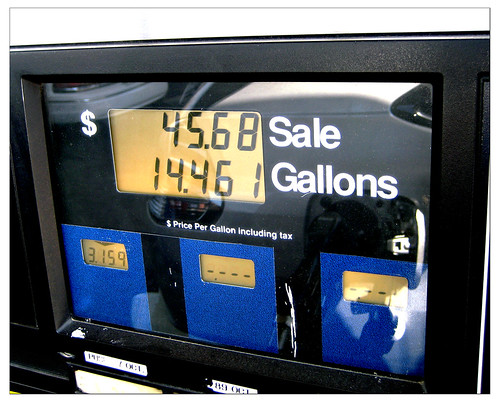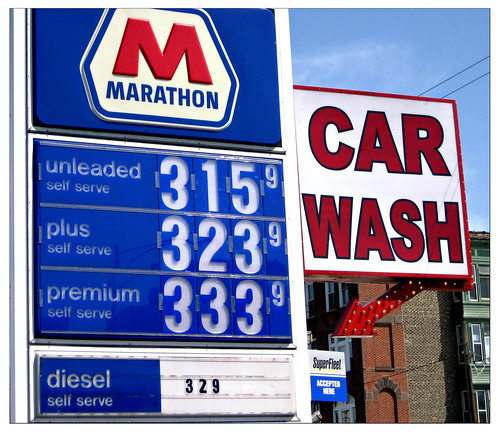Tom Friedman may be right that gas prices should be higher, but with our current leadership (on both sides of the aisle), I don't see any creative solutions being developed any time this century. Gas prices aren't quite the 'third rail' that Social Security is, but are sure close. I foresee plenty of pandering instead.
Personally, I'd rather America was a country that encouraged public transportation, taxed suburban drivers for entering downtown in an auto, built bike lanes everywhere, etc., etc., yadda yadda. I have access to a company car, but haven't owned my own vehicle since the early 90s, so perhaps I'm not the best judge.
Anyway, here's Friedman (and an excerpt from a NYT editorial below).
Thomas Friedman: Gas Pump Geopolitics
If we want to make wind, solar and biomass more competitive, gasoline has to cost more.
In recent days critics have accused President Bush and his new chief of staff of doing nothing more than shuffling around the deck chairs on the Titanic, as they shift, hire and fire senior White House officials while the president's popularity continues to plummet. Personally, I think that is a totally unfair charge — unfair to the captain of the Titanic.After all, he knew where he was going. His lookouts just couldn't see the iceberg spar lurking beneath the surface in their path until it was too late. This administration, and its captain, have been staring the iceberg right in the face for years — it's called dependence on foreign crude oil. It has been totally visible, for miles and miles. And yet the Bush team has just kept sailing right into it, refusing to ask the American people to do anything hard to put America on a different energy course.
What is this iceberg staring us in the face? It is the fact that energy, broadly defined, has become the most important geostrategic and geoeconomic challenge of our time — much as the Soviet Union was during the cold war — for four reasons:
First, we are financing both sides in the war on terrorism: financing the U.S. military with our tax dollars, and Islamist radicals and states with our energy purchases.Second, continued dependence on fossil fuels is going to bring on climate change so much faster in an age when millions of new consumers in India and China are driving cars and buying homes. And that's why renewable fuels and energy-efficient cars, buildings and appliances are going to be the biggest growth industry of the 21st century. The tougher the energy-efficiency standards we impose on our own companies, the more likely it is that they will dominate this new industry.
Third, because of the steady climb in oil prices, the seemingly unstoppable wave of free markets and free peoples that we thought was unleashed by the fall of the Berlin Wall is now being stymied by a counterwave of petro-authoritarian states — like Iran, Venezuela, Russia, Nigeria and Sudan — which now have more petro-dollars than ever to do the worst things for the longest time. They will poison the post-cold-war world unless we bring down the price of crude.
Fourth, we will never plant the seeds of democracy in Iraq and the wider Arab world if we don't also bring down the price of oil. These Arab oil regimes will not change unless they have to, and as long as oil prices are soaring they won't have to. Iraq will become just another Arab state that taps oil wells instead of developing its people.
The beginning of leadership for the president is to tell the American people the truth: This is not your parents' energy crisis. The price of oil is not soaring just because of greedy oil companies. It is soaring because of structural changes in the global energy market that could have vast consequences for America and the world if we do not respond in a comprehensive manner.
Toward that end, we need a tax on gasoline at the pump that will keep prices around $4 a gallon (still roughly $1 less than most Europeans pay), or we need a tax on vehicles that will make gas guzzlers prohibitively costly and hybrids and smaller cars enormously attractive. The sooner and the more we take the price of gasoline up — and keep it there — the sooner we can bring it down forever. If we want to make wind, solar and biomass more competitive, gasoline has to cost more, not less.
The president can start by pushing the bipartisan Fuel Choices for American Security Act, now wending its way through Congress. This bill would mandate that every car sold in America would not just have seat belts, but would also be flex-fuel capable so it could run on ethanol, methanol or gasoline. It would also pave the way for the rapid commercialization of plug-in hybrid vehicles, which would combine electricity and gasoline to get 100 miles out of every gallon of gasoline consumed.
Finally, the bill would offer Detroit loan guarantees for transforming its fleets in this direction. “We're going to have to bail out Detroit anyway, so let's at least get some public benefit,” the energy expert Anne Korin said.
Yes, the president has wasted so much time, but if he finally rises to this challenge, Democrats — who should have taken the lead on this issue a long time ago — have got to work with him. If the Democrats shirk this energy challenge, as the Republicans have, I'm certain there is going to be a third party in the 2008 election. It is going to be called the Geo-Green Party, and it is going to win a lot of centrist voters. The next Ross Perot will be green.
plus, in part, from the NYT editorial board:
The battle to see which political party can out-pander the other on the subject of gasoline prices is embarrassing. If American consumers are having sticker shock at the pumps, it's because of a series of policy failures that stretch back decades. The last thing the country needs now is another irresponsible quick fix.Senate Republicans have proposed to assuage the pain of high gas prices by sending many taxpayers $100 apiece — enough for about two tanks of gas. Meanwhile, a cadre of Senate Democrats is carrying on about a temporary suspension of the federal gas tax, which is 18.4 cents per gallon, the same level it was in 1993. At best, the suspension would temporarily reduce prices a fraction, causing car owners to drive a little more. That rise in demand would send prices back up again.
...Suspending environmental safeguards — as President Bush proposed in his energy speech earlier this week — might send prices down a bit, at the price of dirtier air. It's appalling that a generation after the first oil shock, in 1973, politicians are still reacting with such hysteria.
...
It's important during this debate not to discount the genuine pain being felt by the poor and middle-class families who must drive long distances just to get to work and school. But their problem is more than gasoline prices. It's their vulnerability to the price increases, which results from stagnating wages and a lack of savings. If the Bush administration had devoted as much political capital in the past five years to wage and job growth initiatives as it has to cutting taxes for the wealthy, these struggling families would be better able to weather higher prices at the pump.
Youch.



Tom Friedman lambasts Bush for not seeing this crisis coming. But it was the Dems who have blocked the GOP's energy bill since 2001, only allowing it to pass last year. That's 4 years behind schedule thanks to the Dems. Also, what did Clinton do for 8 years in the White House about energy? Zilch. Now there's plenty Bush could have done better on the environment and energy, but no one should think the Dems don't share responsibility. The post's author is right - both side of isle share blame. I'll add however that the Dems have become the "party of no," offering very little other than criticism of anything the GOP proposes. The Energy Bill, Social Security Reform, are just a few examples.